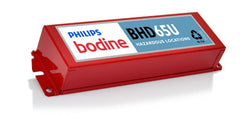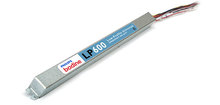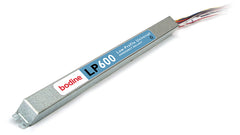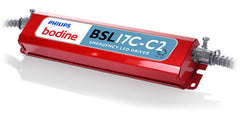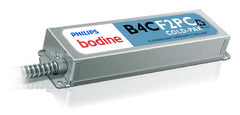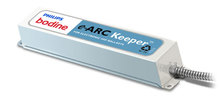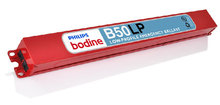- Remote control testing
- For damp locations
- Specification grade
- One- or two-lamp emergency illumination;
- End-of-lamp-life compatible
- Illumination Time: 90 minutes
- Initial Light Output: Up to 1400 Lumens
- Full Warranty: 5 Years (NOT pro-rata)
- Dual Input Voltage: 120/277 VAC, 60 Hz
- AC Input Current: 320 mA
- AC Input Power Rating: 4.0 Watts
- Test Switch: Single Pole
- Recharge Time: 24 Hour
- Dimensions: 13.3” x 2.4” x 1.5”
- Weight: 3.6 lbs. (1.64 kg)

SPECIFICATION
Emergency lighting shall be provided by using a standard fluorescent fixture equipped with a Philips Bodine B50RCT remote control testing fluorescent emergency ballast. Electronic circuitry shall be remote control testing in design and capable of testing emergency lighting for 30 seconds or 90 minutes. The emergency ballast, using a patented circuit, shall delay AC ballast operation for approximately three seconds to prevent false tripping of AC ballast end-of-lamp-life shutdown circuits. The B50RCT shall consist of a high-temperature, maintenance-free nickel-cadmium battery, infrared receiver, charger and electronic circuitry contained in one 13 3/8” x 2 3/8” x 1 1/2” red metal case. A solid-state charging indicator light to monitor the charger and battery, a single-pole test switch and installation hardware shall be provided. One handheld transmitter with 30-second and 90-minute test sequences and a test reset button shall be provided per job site (model WHRCT, sold separately) and shall be capable of testing multiple fixtures equipped with the RCT feature. The emergency ballast shall be capable of operating [one or two] _________ fluorescent lamp(s) (see Table 1) at _________lumens (see Table 2) initial light output in the emergency mode for a minimum of 90 minutes. It shall be suitable for indoor and damp locations and for sealed & gasketed fixtures, including fixtures rated for wet locations. The B50RCT shall have 4 Watts of input power and a 24 Watt-hour battery capacity and shall exceed emergency standards set forth by the current NEC. The emergency ballast shall be UL Listed for installation inside or on top of the fixture and shall be warranted for a full five years from date of purchase.
OPERATION
When AC power fails, the B50RCT immediately switches to the emergency mode, operating either one or two lamps at a reduced lumen output for a minimum of 90 minutes. When AC power is restored, the emergency ballast automatically returns to the charging mode and, using a patented circuit, delays AC ballast operation for approximately three seconds to prevent false tripping of the AC ballast end-of-lamp-life shutdown circuits. During remote control testing, the B50RCT simulates an AC power failure, causing the emergency ballast to switch to emergency mode and conduct a 30-second or 90-minute discharge test to monitor emergency ballast operation. When testing is complete, the B50RCT returns to the charging mode. Depending on fixture type, safety and maintenance personnel may test emergency ballast operation using a handheld remote control transmitter. In addition, the handheld transmitter includes a reset option that cancels unintentional activation.
NOTE: For end-user convenience, the emergency ballast is supplied with a single-pole test switch. Manual testing may be conducted at any time.
INSTALLATION
The B50RCT does not affect normal fixture operation and may be used with either a switched or unswitched fixture. If a switched fixture is used, an unswitched hot lead must be connected to the emergency ballast. The emergency ballast must be fed from the same branch circuit as the AC ballast. The B50RCT may be installed inside or on top of the fixture. Installation is not recommended with fixtures where the ambient temperature may fall below 0°C. NOTE: The infrared receiver should be installed flush with the inside of the fixture lens, creating a line-of-sight path to the remote control
transmitter.





